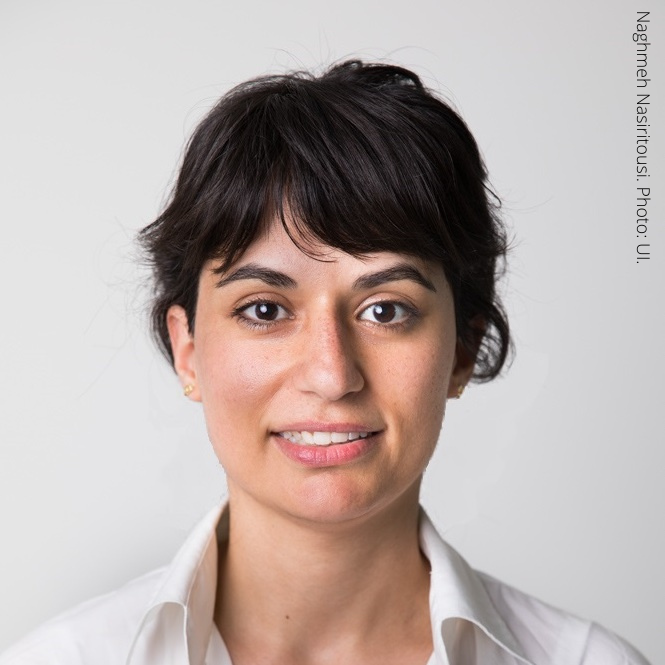
Naghmeh Nasiritousi is an Associated professor and researcher at Stockholm University and the Swedish Institute of International Affairs. She works primarily with issues around climate action in the post-Paris climate policy landscape.

Q: Can we talk about sustainable development solutions or is it better to refer to alternative sustainable solutions to development?
A: In my research, I look at pathways towards carbon neutrality and investigate how governments aim to go net-zero. The Paris Agreement came up with a bottom-up architecture in which governments themselves choose solutions. We aim to assess how governments come up with these. We are facing unprecedented climate change consequences: it is not enough to simply reduce emissions, but we need to remove carbon dioxide from the atmosphere.
Viable solutions do exist. The Intergovernmental Panel on Climate Change said we need to redefine development, including concepts such as well-being economy, aiming at leaving no one behind. This is a much more holistic vision than current models: focusing more on human development, rather than only economic development, would also increase resilience.
Q: Your PhD thesis from Linköping University (Nasiritousi, 2016) examined the roles of non-state actors in global climate change governance. How is the state-of-the-art today, 7 years after the adoption of the Paris Agreement?
A: The literature has been growing very fast due to the more prominent role of non-state actors in the policy area internationally. Recent literature emphasizes the need for coordination and multilateral cooperation. We also see the need for directionality where governments set a role. As a researcher, I have attended several UN climate meetings and had the opportunity to observe different non-state actors and the ways in which they seek to influence policy-makers. We must consider that non-state actors represent different interests. My thesis showed that there are many types of non-state actors involved in climate governance, and that it is important to recognize that they do not all pull in the same direction. Governments can engage non-state actors to accelerate decarbonization, but it is still the state that has responsibility for making sure action is taken to reduce emissions.
Q: Small-income and developing countries are often severely affected by extreme climate phenomena and have at the same time fewer resources to counteract or contain them. How can locally grounded solutions – promoted by these countries’ universities and research centres – be supported as opposed to top-down forms of aid?
A: This is a very big question in climate policy. There is a huge demand for capacity support and financial resources, but often actors from the North are reluctant to direct those resources.
I do believe that both solutions, bottom-up and top-down, are needed. I’m not an expert on how to make this happen, but I would suggest creating more partnerships involving developing countries. Capacity building needs to start from the local level using existing expertise.
Q: You lead the project Pathways to Carbon Neutrality, funded by the Swedish Energy Agency. Could you tell us what that is? Which are the implications for Sweden within the European and global climate frameworks?
A: We are studying strategies submitted by countries, aiming to identify how each country defines decarbonatization. By examining what different states highlight as viable paths toward net-zero economies, we also explore how international cooperation could accelerate the transition. For instance, we examine the idea of “climate clubs” that had previously been highlighted by economists but that are also frequently mentioned in policy circles, such as by G7 leader Germany. While the idea of climate clubs carries different meanings in the literature, the prevalent one in the economic literature is about a group of ambitious countries benefitting from reducing emissions, while punishing non-members through sanctions for example. We examine the political feasibility and desirability of this idea and how other types of climate cooperation could accelerate decarbonization. We also examine the European Green Deal and its design of a carbon border adjustment mechanism that would represent the world’s first carbon border tariffs. Sweden has been active in many international cooperation initiatives on climate and has a prominent role in initiatives on industrial decarbonization.
Q: SweDev aims to connect development researchers across Sweden to strengthen collaboration with practitioners. Which are your three most important research-based outcomes contributing to the 2030 Agenda and carbon-stockage projects that you would like to share with your colleagues or practitioners?
A: 1. We are experiencing a slow shift in reducing emissions, and it is not enough with incremental change. Today we have much of the knowledge and many solutions, but politics still play a central role when it comes to implementing and navigating interests, many coming from vested interests that depend on continuing fossil-based economies;
2. Power inequalities need to be addressed: greater participation in decision-making, especially from marginalized actors;
3. Politicians can accelerate the transition by enhancing the coalition of actors and strengthening the voices calling for transformation.
The recent war is once again emphasizing the need for systems thinking. The high fuel prices should lead us to higher investments in renewables. We need more synergies to face crises in the upcoming decades.
Written by Alessandro Giacardi, Communication, and Research Intern at Stockholm Environment Institute (SEI) for the Development and Aid Policy Team and SweDev. Edited by Alice Castensson, and Ylva Rylander at Stockholm Environment Institute (SEI).

Recent Comments